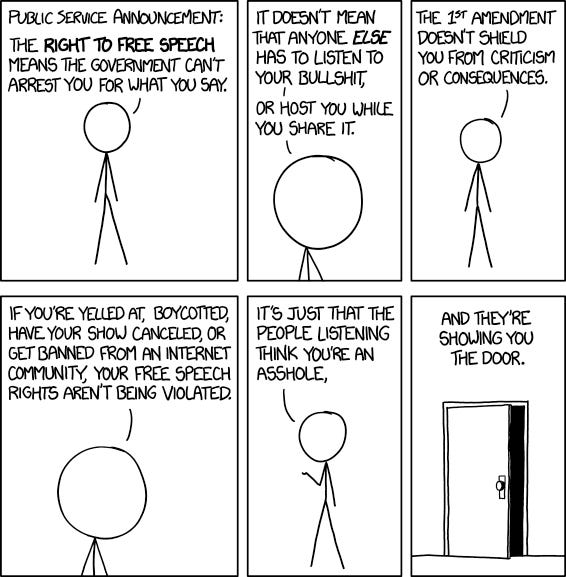Sometimes the smallest of things have the largest effects. Whenever I think about what did the most damage to internet culture over the past ten years, this comic comes out on top:

Not Twitter. Not Facebook. This comic that probably took Randall Munroe less than an hour to create.
The United States Bill of Rights is not merely a mechanistic document. Yes, we use it, together with the court system, to resolve any disputes we have with the US government. But as crucial as this function is, it isn’t the only purpose of the Constitution. The other purpose of our founding documents is to act as a cultural North Star when we are adrift in the dead of night. What collective choices will we make when we are angry, or scared, or complacent, or confused?
Why didn’t Oklahoma City residents just hang Timothy McVeigh in the street for murdering 168 people? Many of them lost so much in that building a mere threat of a life sentence would not have deterred them. Why do we get angry at social media companies if we suspect they sell our data to advertisers? How did we even get the idea that we ought to expect a level of privacy from corporations? Why do so many of us think that felons who have served their entire sentence should have the right to vote? Why do we bother defending the rights of people who harmed our society?
These ideas seem so natural it doesn’t even occur to us that they were invented. We may know it intellectually, but not with our hearts. In our hearts fair trials, privacy contracts, and defending rights of ex-cons are as natural as clouds and water. Yet in many other countries— perhaps still in most of them— mob justice, unethical businesses behavior without complaint, and complete disregard for any rights of criminals is a normal daily occurrence. Their citizens know that far away silly Americans bother with fair trials and non-ironically litigating the temperature of coffee, but it would never occur to them that it may be a reasonable thing to try in their own society.
Why? Where do we get these ideas? Why do so many of us hold on to them with all our strength, even when it’s inconvenient or dangerous? Are we intrinsically better people than rural Indians or Somalians or Hondurans? Perhaps we could have permitted ourselves such delusions in 2019, but you’d have to be willfully blind to permit them in 2020.
If we allow erosion of tolerance for disagreeable speech in a cultural sense, erosion in a legal sense will follow. But that’s not why the “free speech” xkcd comic is pernicious and wrong. It’s wrong because it contains a profound misunderstanding— that America’s founding documents are nothing more than legal tools.
Freedom of speech isn't just a legal assurance that congress shall make no law abridging it. It is also a set of cultural norms rooted deeply in a long lineage of hard won ideas. It is Friedrich Nietzsche's dictum that only insecure societies are threatened by quirky characters with weird ideas. It is Evelyn Hall's principle "I disapprove of what you say, but I will defend to the death your right to say it". It is my friend Daniel's observation that tolerance is the experience of suffering through unpleasant ideas. We endure that suffering because the world is dramatically better on balance when we do.
from Hacker News https://ift.tt/34AjrXH
No comments:
Post a Comment
Note: Only a member of this blog may post a comment.